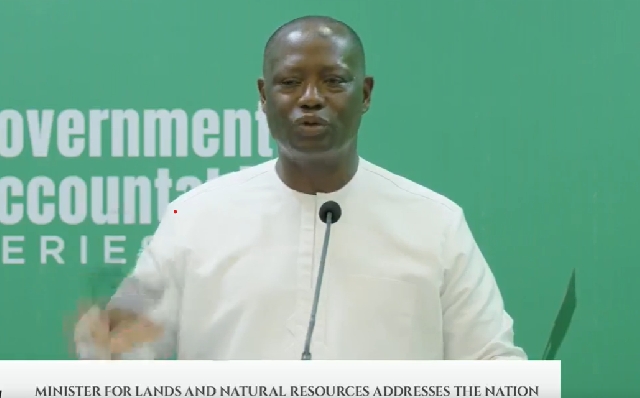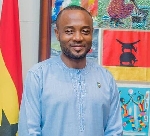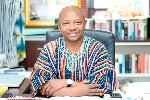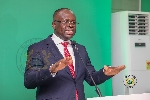Full text of Land Minister's presentation at Gov't Accountability Series
 Emmanuel Armah Kofi Buah
Emmanuel Armah Kofi Buah
SPEECH: HON. EMMANUEL ARMAH-KOFI BUAH(MP), MINISTER FOR LANDS & NATURAL RESOURCES EVENT: GOVERNMENT ACCOUNTABILITY SERIES
DATE: 23RD JULY 2025
VENUE: THE PRESIDENCY
1 Minister - Government Communications, Hon. Felix Ofosu-Kwakye, Heads of Agencies
Ladies and gentlemen, Good morning Since the inception of this government, President Mahama’s vision of Resetting Ghana has been in full force, and Ghanaians have appreciated the dedication and commitment of all those who have been tasked with the privilege of serving – including those of us at the Ministry of Lands and Natural Resources.
Our mandate is to ensure the sustainable management and utilisation of the nation’s lands, forests, and wildlife resources, as well as the efficient management of our mineral resources for socio-economic growth and development.
Under the purview of the Ministry are 10 agencies, including the Lands, Minerals, and Forestry Commissions, the Ghana Geological Survey Authority, the Ghana Boundary Commission, the Office of the Administrator of Stool Lands, the Ghana Integrated Iron and Steel Development Corporation, the Ghana Integrated Aluminium Development Corporation, and the Minerals Development Fund.
The Ministry actively collaborates with other ministries and private-sector stakeholders, including Traditional Authorities, academic institutions, the media, and civil society organisations, among others.
2 Today, I am privileged to highlight our achievements at the Ministry of Lands and Natural Resources, year to date.
• UPDATE ON ILLEGAL MINING ACTIVITIES
The Mining Sector is the lifeline for millions of Ghanaians, and as we all know, Ghana is blessed with an abundance of minerals – Gold, diamonds, bauxite, iron, salt, and others.
These natural resources are under unprecedented global strain due to rapid population growth, urbanisation, escalating demand for raw materials, and the compounding effects of climate change.
The Government of H.E. John Dramani Mahama recognises that for Ghana to fully harness the benefits of its mineral wealth, the law must be strengthened to ensure equity, sustainability, and shared prosperity for all stakeholders, especially our communities, which bear the direct brunt of mining activities.
That is why we are undertaking a comprehensive legislative and policy review at the Minerals Commission.
The Minerals and Mining Act 2006 (Act 703), as amended, and the Minerals and Mining Policy (2014) are under review with extensive stakeholder engagement and are at 85% completion stage.
Some significant changes to be made include: i. Drastically reducing the number of years that prospecting licences are held from perpetuity to a defined minimal period.
3 ii. reducing the upper limit for the number of years for the grant of a mining lease from thirty (30) years to an agreed period
iii. Abolishing Development Agreements and enforcing the signing of Community Development Agreements (CDA) imposing a rate of an agreed percentage of gross revenue from the sale of minerals to fund the community development projects to help fast-track the development of mining communities
iv. Introducing a three-tier mineral right regime by including a medium-scale licence
v. Reducing the upper limit for stability agreements from the current fifteen (15) years to allow for capital recovery for huge investments only or abolishing it altogether.
vi. Abolishing the automatic right to the renewal of licences when certain conditions are not met Under the leadership of His Excellency, President John Dramani Mahama, and with extensive stakeholder engagements that include traditional authorities, civil society groups, and academia, Government is committed to ensuring that the review of the Act corrects the imbalances of the past and secures a brighter future for the benefit of all Ghanaians In the fight against galamsey, 55 small-scale mining licenses issued during the transitional period were revoked at the beginning of the year.
Additionally, 907 out of 1,278 licenses are now under review for 4 possible revocations due to irregularities identified by the Small-Scale Mining Review Committee.
A similar exercise is currently ongoing to review large-scale mining licenses to ensure compliance.
These measures are aimed at sanitising the mining sector to ensure transparency and sustainable operations.
In collaboration with other agencies, including the Ghana Police Service, the Ghana Armed Forces, and the National Security Secretariat, 425 excavators and other machinery have been seized.
We have also made 1,345 arrests nationwide, and prosecutions are steadily progressing.
I believe the Attorney-General will speak to this in his updates.
For instance, in Forest Reserves alone,
• 177 excavators
• 4 bulldozers
• 12 vehicles,
• 43 motorcycles,
• 155 pumping machines,
• 184 changfangs,
• 15 detector machines, and
• 10 heavy-duty generators have been seized across the country.
• 286 persons have been arrested.
To coordinate the efforts of the military, police, and other security agencies, the Ministry has established the National Anti-Illegal Mining 5 Operations Secretariat (NAIMOS) as the operational nerve-centre for Ghana’s fight against illegal small-scale mining and its associated environmental degradation, particularly in water bodies and forest reserves.
It embodies Ghana’s coordinated response to the scourge of illegal mining, integrating security, environmental, and legal responses into a unified operational strategy. In collaboration with the Ministry of Transport and the Ministry of Finance (GRA-Customs Division), and the Ports and Harbours Authority, we have initiated a proactive tracking of all imports of excavators and earth-moving equipment from the point of entry.
So far, 1,200 excavators have been impounded pending validation before clearance at the Tema Port.
The development of a centralised digital platform named the Ghana Mine Repository and Tracking Software has been deployed by the Minerals Commission and is at an advanced stage to support this initiative.
The platform will serve as the single point of integration for all agencies, including Customs, DVLA, the Ministry of Transport, the Minerals Commission, National Security, and the National Anti-Illegal Mining Operations Secretariat. This system will ensure transparency, prevent duplication, and provide authorised institutions with real-time access to permit history, equipment location, and operational compliance.
6 A pilot project of over 191 excavators is currently being tracked in the dedicated control room of the Minerals Commission.
This is woven around the Minerals and Mining (Mineral Operations-Tracking of Earth Moving and Mining Equipment) Regulations, 2020 (L.I. 2404), which prescribes the mandatory registration of all earth-moving and mining equipment that is to be used in mining operations.
L.I. 2404 ensures that machinery and equipment are tracked in real time and used only in mining areas for which they have been registered.
To address the challenge of water pollution by illegal mining activities, the Blue Water initiative was launched within the first 120 days in line with the Government’s promise.
So far, over 450 personnel have been trained and deployed.
I am happy to announce that the second batch of 530 Blue Water Guards will be graduating this Friday (25th July), which will bring the total number of trained guards to 980.
The target is to train 2,000 personnel by the end of the year.
The deployment strategy for the Blue Water Guards is non-confrontational.
They act as intelligence officers and also engage with local communities to raise awareness about the importance of environmental conservation and the negative impacts of illegal mining.
The second phase of the Blue Water Initiative will focus on dechemicalizing the water bodies to restore them to their pristine conditions – feasibility studies are steadily underway.
The Minerals Commission, in consultation with the Chamber of Mines, 7 has completed its annual review of the Fifth Edition of the Procurement List in compliance with Regulation 7(3) of L.I. 2431- the Minerals and Mining (Local Content and Local Participation) Regulation, 2020.
Effective January 2025, the revised list introduces enhanced Ghanaian participation requirements, with certain items now exclusively reserved for domestic businesses.
This is to enhance the Local Content Regulation, increase Ghanaian participation, and in-country value in the mining sector.
In line with the Government’s vision to create sustainable jobs through responsible cooperative mining, Cabinet has approved the implementation and transition of the Community Mining Scheme (CMS) and the National Alternative Employment and Livelihood Programme (NAELP) into the Responsible Cooperative Mining and Skills Development Programme (rCOMSDEP).
This new program will act as Ghana’s flagship initiative to reform artisanal and small-scale mining (ASM) by combining lessons from the Community Mining Scheme and NAELP through community ownership, for sustainable and responsible mining in a structured and regulated manner.
The program has successfully trained and supported 127 youth with startup kits for apprenticeship and skills development programs in 8 partnerships with AngloGold Ashanti and the German Agency for International Cooperation (GIZ).
At its core, the programme will foster the creation of locally owned mining cooperatives, providing members with professional training, legal concessions, and access to shared processing facilities equipped with modern recovery technologies and water treatment systems.
Forestry Commission One of the greatest challenges of the Forestry sub-sector is deforestation and forest degradation, largely due to illegal mining (galamsey), illegal logging, wildfires, and unsustainable agricultural practices. Within Forest Reserves alone, over 5,500 hectares (equivalent to 7,500 football fields) have been degraded.
I am happy to announce that, in collaboration with law enforcement agencies, the Forestry Commission has successfully repossessed all nine (9) redzoned forest reserves previously occupied by armed gangs protecting illegal miners.
Additionally, 279 trucks conveying illegal lumber were intercepted, fined, and the illegal wood, confiscated and auctioned.
As Government's strategy to promote legal timber trade, Ghana entered into a voluntary partnership agreement with the EU aimed at ensuring only legal timber from sustainably managed forests are 9 exported to the EU market.
Subsequently, Ghana is expected to issue a Forest Law Enforcement Governance and Trade (FLEGT) license to accompany all wood exports to the EU Market.
Ghana is at the final stage of completing the processes for issuance of the license, and the key outstanding requirement is the ratification of Timber Utilization Contracts (TUC’s), which is currently before Parliament for consideration.
The effective date for the FLEGT license is 8th October 2025. Tree For Life Initiative A major reforestation program of the Ministry is the "Tree for Life” initiative.
This was launched by H.E. John Dramani Mahama at Nkawie in the Ashanti Region, in March this year. On June 5, the President again led the nation to commence the tree-planting exercise, emphasising the government’s commitment to planting 30 million trees.
As of mid-July 2025, a total of 7.6M seedlings have been distributed and planted (25%), out of which 2.3M were planted by the private sector.
The planting campaign is ongoing, with the target expected to be met by the end of the rainy season in October 2025.
To promote ecotourism, the Commission has received proposals from strategic partners to invest in five (5) potential sites (Digya National Park, Shai Hills Resource Reserve, Kalakpa Resource Reserve, Sakumono Ramsar Site, and the Muni Pumadze Ramsar Site).
The 10 proposals are being reviewed for Public-Private Participation, to develop these areas for tourism and local economic growth. One critical area of importance is geological investigations, which sits with the Ghana Geological Survey Authority (GGSA).
The Authority supports small-scale miners with data on mineralised areas to assist with proper and regulated mining activities, and we intend to re-tool the Authority to deliver on its mandate.
We have also successfully monitored seismic activities nationwide, with data confirming no imminent geological risks.
Critical findings are utilised to inform engineering designs for infrastructure development, enhancing construction safety standards.
We conducted geothermal investigations and mapping to evaluate the viability of integrating geothermal energy into Ghana’s energy mix.
The findings will support the diversification of renewable energy sources in alignment with national sustainability goals.
Furthermore, GGSA is completing investigations on clay deposits in the Greater Accra, Volta, and Central Regions, identified as high-potential raw material for the ceramic and cement industries, with prospects to boost local industrial production and contribute to economic growth and job creation.
11 • LAND ADMINISTRATION AND MANAGEMENT
As part of the Reset Agenda to ensure that the administration of Lands reaches the doorsteps of every Ghanaian, the Lands Commission has been instructed to decentralise its operations to all districts across the country.
I am happy to announce that 90 new district offices in underserved areas have been identified so far. It is expected that by the end of this year, every district will have a Lands Commission office.
This initiative aims at bringing land services closer to citizens, reducing congestion at regional offices, and strengthening land governance at the local level.
In addition, the Lands Commission is working towards a turnaround time for the completion of all applications within 30 days.
The Ministry has also established a committee to conduct a comprehensive review of all public land allocations to enhance transparency, accountability, and alignment with national development priorities.
The committee is expected to turn in its report in August 2025.
The Legislative Instrument to fully operationalise the Land Act 2020 (Act 1036) has been prepared and is being reviewed by the Attorney General’s Department.
The Commission is also reviewing the 1999 National Land Policy to align it with international best practices and emerging trends in land governance.
The process includes stakeholder consultations and expert input, with the updated policy expected to be finalised by December 2025.
12 Again, I am happy to report that the Lands Commission has collaborated with the Land Use and Spatial Planning Authority (LUSPA) and the Ministry of Local Government, Chieftaincy, and Religious Affairs to integrate local plans as base maps for land registration as part of Government’s efforts to digitalise land services.
We have also upgraded the Enterprise Land Information System (ELIS) to enhance transparency, accountability, and public access to landrelated information (fees, processes, etc) to be rolled out in all 16 regions. We have also introduced a QR code feature with address verification to authenticate and validate site plans, significantly reducing turnaround times for land registration.
The Office of the Administrator of Stool Lands (OASL) has engaged with 548 communities, including traditional authorities, clan heads, and District Assemblies, to address challenges affecting revenue mobilization. As of June 2025, the agency had mobilized and disbursed GHS 63.8 million.
These funds have been disbursed to all regions except the Volta and Upper West Regions, which are not stool land areas.
Additionally, the Office has recorded approximately 1,000 land rights to facilitate the demarcation and establishment of Customary Land Secretariats nationwide, further enhancing revenue collection efforts.
13 The Ghana Boundary Commission has conducted preliminary orthophoto mapping to complete the first phase of a 150km Joint Boundary Reaffirmation Exercise in the Western Region on the GhanaCôte d’Ivoire border.
This exercise was undertaken in a bid to strengthen border security and management, with a similar exercise with our Togolese neighbours over a 350km stretch to combat smuggling, irregular migration, and cross-border threats.
On Maritime Boundary Inspections, we have completed four (4) joint maritime inspections with Côte d’Ivoire, confirming full compliance with established boundaries.
We have also generated accurate geospatial data to support future boundary marker construction and bilateral cooperation.
In order to address transnational organised crime and promote sustainable livelihoods in border communities through skills training and sensitization initiatives, the Ghana Boundary Commission implemented Phase II of the “Mitigation of Destabilising Effects of Transnational Organised Crime Project”, reaching 4,600 residents in 20 border communities in the Upper West & Savannah Regions.
The Minerals Development Fund has implemented several strategic initiatives to foster sustainable development and create alternative economic opportunities in mining communities.
14 Under the auspices of the Ministry, the MDF is conducting a comprehensive feasibility study for poultry feed production to complement the government’s “Nkokɔ Nketenkete Programme."
This initiative will provide viable alternatives to imported feed products, create employment opportunities for the youth, support national food security objectives, and advance import substitution strategies.
The Ghana Integrated Iron and Steel Development Corporation (GIISDEC) seeks to bring order to the scrap metal industry.
To this end, a Scrap Metal Policy has been developed to regulate the industry.
The Corporation has successfully issued three licenses, covering an area of 397.5 km² for the Sheini Iron Ore Project. Additionally, the Gyamurume and Bodada Block II and the Pudo Iron Ore Block have yielded high-grade iron ore in exploration results.
These Blocks are now ready for exploitation, pending investor interest. At the heart of Ghana Integrated Aluminium Development Corporation’s (GIADEC) vision is a commitment to unlock the full potential of Ghana’s bauxite reserves, while ensuring long-term value creation for the country.
In line with this vision, and in support of Government's "Resetting Ghana" agenda, we developed a new strategic path and policy objectives to guide GIADEC toward becoming 15 a financially sustainable and commercially independent state institution.
GIADEC secured six (6) bauxite mining leases in June 2025, pending Parliamentary ratification.
This aims to strengthen Ghana’s control over its bauxite resources and accelerate extraction to 2 million metric tonnes per annum.
We are exploring strategic partnerships in new bauxite mine development, including a 250km railway infrastructure for bauxite transport, expansion of the Takoradi Port, and improved development for VALCO. All these efforts align with Ghana’s vision to become a global player in the Integrated Aluminium Industry.
• CONCLUSION
Ladies and gentlemen, the Ministry of Lands and Natural Resources is on course to achieve its mandate - to ensure the sustainable management and utilisation of the nation’s lands, forests, and wildlife resources, as well as the efficient management of our mineral resources for socio-economic growth and development.
Let me make it clear, the Ministry is under no illusion that the fight against illegal mining is an easy one – we know that it is a marathon not a sprint.
We will definitely prevail! We are also not against Mining, but we believe that mining MUST be done Responsibly and Sustainably, and we will do everything to support Responsible Mining.
But ladies 16 and gentlemen, we have drawn a line in the sand, and we will fight against irresponsible, reckless mining activities in any form.
Let me also assure the good people of Ghana that we are steadfast, committed, and focused on winning this fight of our lifetime.
And with the political will and support of H.E. the President John Dramani Mahama, we will ensure that our water bodies are turned blue, our forests are turned green, and our environment is restored and preserved for posterity.
I therefore call on all well-meaning Ghanaians and other partners to join us in this fight to save the soul of our country. Thank you, and may God bless our homeland, Ghana.
Source: Classfmonline.com/Cecil Mensah
Trending Features

‘Accountability and Respect for Law’: A word from MP, lawyer Jerry Ahmed Shiab on International Day of Justice
19:30
President John Dramani Mahama's engagement with Alex Soros, an American billionaire and philantropist
19:15
Full text: Gov't statement on National Cathedral project
05:17
How to avoid romance scams
15:43
A $14,520 Visa Burden: The Cost of a Divided Africa
10:28
Full text of Defence Minister's presentation at Gov't Accountability Series
13:03
Full text of Land Minister's presentation at Gov't Accountability Series
02:28



